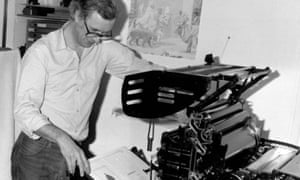Readers rarely come to know about one person who devotes the most obsessive care and attention to the book they are reading: the typesetter.
Michael Mitchell, the enormously gifted, sharp-tongued, impish, chain-smoking man who typeset all my books, ran the Libanus Press with one partner, Susan Wightman, and together they turned out book after elegant book. His views on type were strong. Once, asked to identify a typeface, he wrote back: "Awful font. We think all except capital I are Futura Extra bold – the slab seriffed cap I is probably drawn. Slabbed cap I's are a serious abomination."
His 'studio' for that is what it ought to be called, was in a beautiful house in Marlborough, Wiltshire. It had lovely huge rooms had an exquisitely groomed garden at the back, as perfect as a well-set page. The times I visited him, there was always lunch and wine and smoke and talk as well as work and always a book at the end as a gift.
He died in November, aged 78.
Here is his obituary from The Guardian
Michael Mitchell obituary
Typographer and designer who aimed for perfection with his books
Michael launched into his career as a printer and publisher in 1975. At a chance meeting with Richard Shirley Smith, the painter and wood engraver, Shirley Smith offered Mitchell his old press, a stalwart 1860 Albion, together with some Monotype type. With this Michael began typesetting and printing broadsides and small poetry books in his garage. He founded Libanus Press and in 1979 moved to Marlborough, Wiltshire. As professional printers were disencumbering themselves of their machinery with the advent of the digital era, he collected several other presses. He acquired greater quantities of lead type and then a Monotype caster. This considerably widened the range of his type styles.
(Read the rest of this article here)

